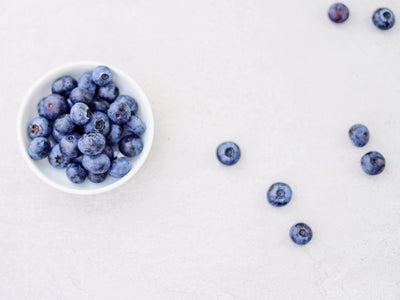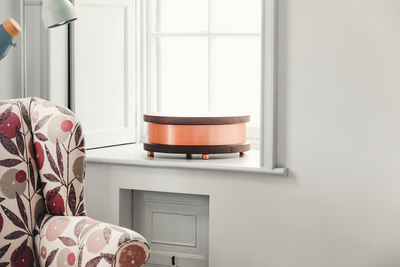25 Science-Backed Ways to Support Your Gut Microbiome: PART 1

In our last article, we delved deep inside the human body to learn more about the mysterious world of the microbiome. We discovered how the state of the microbial menagerie living in your gut can affect everything from weight gain, anxiety, immunity, hormonal issues, allergies and depression.
We uncovered what the microbiome is made up of and how it’s formed. Crucially, we also learnt that it is possible to change your gut microbiome for the better – transforming your health in the process.
Now, we’re revealing 25 of the best, research-backed ways you can nourish and support your gut microbiome – starting today.
💧Drink filtered water
According to a new research paper [1] (the first ever to investigate the link between the gut microbiome and tap water), the differing levels of chloride, sulphate and sodium found in UK drinking water have a “significant” influence on the population and diversity of microbes in our guts. Even if our water isn’t as pure as it appears, one thing seems clear – by drinking filtered water, you’re giving your gut a greater fighting chance of staying healthy.
🍏 Eat organic
Unfortunately, no matter how many plump tomatoes and luscious greens you devour, if they’ve been sprayed with pesticides, you’ll be undoing some of your good work. Glyphosate (AKA ‘Roundup’ herbicide), is a known toxin – and the world’s most widely used weedkiller. Patented as an antibiotic, antifungal and anti-parasite, it kills weeds – but (even at ‘safe’ usage levels) it also kills good bacteria[2] – which is bad news for your microbiome.[3] Studies reveal that glyphosate levels found in the human bloodstream have spiked by more than 1,000% in the last 20 years, with scientists warning it poses “a significant public health concern”. Choosing organic produce is one of the easiest ways to reduce your exposure to – and save your gut from – toxic chemicals like glyphosate.
😴 Prioritise sleep
When we think about improving our gut health, sleep might not be the first factor that springs to mind – but it’s an important one. Research shows[4] how just two nights of poor sleep can increase the levels of bacteria associated with obesity and type 2 diabetes in a healthy person’s gut.
Another new study shows[5] how a lack of sleep can have a direct, negative effect on the gut microbiome, leading to a less diverse population of gut microbes. Given the gut-brain connection, it can be all too easy to fall into a vicious cycle of poor sleep = poor gut health = worse sleep = deteriorating gut health. However, this works both ways – meaning better sleep will equal a healthier gut – so anything you can do to improve your sleep quality will, in turn, have a positive impact on your microbiome.
🍭 Avoid sugar and artificial sweeteners
If you want to keep your gut health in tip-top condition, it’s time to kick the sugar-habit. Sugar provides no nutrients; only calories. It also messes with your blood sugar levels, increasing your risk of obesity and type 2 diabetes, amongst other issues. Artificial sweeteners are no better – and potentially even worse for your microbiome. By feeding the wrong bacteria, they’re capable of provoking an inflammatory response and changing the balance of your gut flora. Switch from sugary drinks to herbal teas, and replace sweet treats with dark chocolate and nuts to better feed the health-promoting microbes in your bowels.
💪🏿 Try High Intensity Training
Research shows[6] that exercise can increase the levels of beneficial bacteria in your gut, encouraging a greater biodiversity of gut flora. Any type of exercise will help, but for optimal health, you need to inject some intensity. This is where High Intensity Traning (HIT) comes in. HIT works to stimulate your mitochondria – the powerhouses found at the core of almost every cell in your body. Further studies have demonstrated[7] that endurance training for 30 – 60 minutes, three times a week, can lead to an increase in short-chain-fatty-acid (SCFA) producing microbes; otherwise known as anti-inflammatory compounds produced by beneficial gut bacteria that help regulate the immune system and heal gut damage.
☀️ Feel the sunshine on your skin
Vitamin D - the ‘sunshine vitamin’ - informs your entire body. In recent years, it’s increasingly been linked to gut health, too – with studies showing[8] that sunlight exposure can influence the composition of your microbiome[9] – improving its diversity and thereby reducing inflammation. Avoid the midday glare and get some sunshine on your skin first thing in the morning, when you can enjoy the benefits of the sun’s rays without worrying about burning.
🍞 Steer clear of excess gluten
Gluten is found in grains like wheat, and is commonly used in processed foods such as bread, cakes, pasta, cereals and biscuits. The problem is, we’re not eating the same wheat that our ancestors ate. Modern (non-organic) wheat has been heavily sprayed with toxic pesticides, genetically modified and hybridised to make it drought-resistant and faster-growing. It has also been deamidated, making it water soluble and possible to mix into almost any processed food imaginable. All of these factors combined can lead, in some cases, to intolerances, sensitivities and inflammation. If eating gluten leaves you feeling worse-for-wear, try taking your carbs from whole plant sources like sweet potato, lentils and beans instead – all of which nourish your gut microbiome.
🍷Enjoy a glass of red wine
Whilst downing large volumes of alcohol is unquestionably very bad for you and your gut (after all, pure alcohol kills microbes – hence why we use alcohol hand gel and wipes), research suggests[10] that consuming modest amounts of alcohol could actually be healthy. Not all alcohol is created equal, however. Red wine, for example, is jam-packed with gut-friendly polyphenols. One study showed[11] that drinking a glass of red wine every evening with dinner for 20 days resulted in a marked increase in ‘good’ gut bacteria associated with slimness and lowering cholesterol. Stick to biodynamic / organic varieties; we love www.vintageroots.co.uk/ and www.dryfarmwines.com/.
🐝 Eat raw honey
Raw, unpasteurised, preferably local (so it informs your body of your local environment, helping to ease allergies like hayfever) honey is a potent prebiotic – meaning it nourishes the beneficial bacteria that live in your gut.[12] It contains oligosaccharides, which are not digestible in the small intestines – meaning they make it to the large intestines intact, where the good bacteria turn them into nutrients. Drizzle it on toast, into tea and salad dressings.
🐟 Up your omega-3 intake
Eating oily fish rich in omega-3 fatty acids (such as salmon, tuna, mackerel and sardines) has been shown to significantly increase levels of bacteria associated with butyrate production. Butyrate is an SCFA that plays a key role in maintaining gut health, controlling inflammation and helping to prevent leaky gut syndrome. If you’re veggie or vegan, get your omega-3 fix from flax seeds, walnuts and hemp oil.
🍔 Ditch processed foods
By eating saturated fats, found in fast-foods like burgers, pies and pastries, you inadvertently feed the inflammatory microbes in your gut – possibly even going on to trigger changes in mood and mental health.[13] The same goes for the chemical additives used to extend the shelf life of packaged, processed foods; which can also actively suppress beneficial, anti-inflammatory microbes. If you’re serious about improving the health of your microbiome, it’s best to avoid anything ultra-processed or artificial wherever possible.
📲 Mitigate against EMFs
We already know that prolonged exposure to electromagnetic radiation (of the sort emitted by smart phones, laptops and Wi-Fi routers) can adversely affect our wellbeing in different ways. Emerging research suggests that electromagnetic radiation can have an impact on bacteria, too – potentially making them resistant to antibiotics,[14] and slowing the growth of beneficial bacteria[15] –allowing harmful bacteria to take over. Whilst we wait for further research on the direct link between EMFs and the gut microbiome to emerge, it makes sense to mitigate against their negative effects. Test your home’s EMF levels using a meter – and, if high levels are present – try using protective devices, and install shielding tools.
UP NEXT: Discover tactics 13 – 25 in 25 Science-Backed Ways to Support Your Gut Microbiome: PART 2
References
[1] https://www.sciencedirect.com/science/article/pii/S0048969720332174?dgcid=author
[2] https://neurohacker.com/gut-health-microbiome-dr-zach-bush-m-d
[3] https://www.theguardian.com/environment/2018/may/16/glyphosate-shown-to-disrupt-microbiome-at-safe-levels-study-claims
[4] https://www.sciencedirect.com/science/article/pii/S2212877816301934
[5] https://journals.plos.org/plosone/article?id=10.1371/journal.pone.0222394
[6] https://www.ncbi.nlm.nih.gov/pmc/articles/PMC4446322/
[7] https://pubmed.ncbi.nlm.nih.gov/29166320/
[8] https://www.frontiersin.org/articles/10.3389/fmicb.2019.02410/full#h5
[9] https://pubmed.ncbi.nlm.nih.gov/30324342/
[10] https://academic.oup.com/eurheartj/article/36/15/939/2293194
[11]https://academic.oup.com/ajcn/article/95/6/1323/4568378?itm_medium=sidebar&itm_content=ajcn&itm_source=trendmd-widget&itm_campaign=trendmd-pilot
[12] https://academic.oup.com/fqs/article/1/2/107/3860141
[13] https://pubmed.ncbi.nlm.nih.gov/25173628/
[14] https://journals.sagepub.com/doi/full/10.1177/1559325816688527
[15] https://www.marioninstitute.org/electromagnetic-load-a-hidden-factor-in-many-illnesses/




























